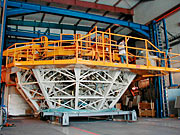Press Release
"First Light" Approaches for VLT MELIPAL
12 January 2000
After the first two Unit Telescopes of ESO's Very Large Telescope started their operation in 1999, the year 2000 will witness the "first light" of the other two telescopes, starting with MELIPAL.
The year 1999 was a very busy one at ESO's Paranal Observatory, the site of the Very Large Telescope (VLT). Soon after the official Inauguration on March 5, 1999, regular observations started with the first 8.2-metre VLT Unit Telescope ANTU. During the first nine months of operation (April - December 1999), about 79,000 exposures were made with the FORS1 and ISAAC astronomical instruments at this telescope. Altogether, more than 68 Gigabytes of unique data were gathered during this period for about 200 individual research programmes and stored in the VLT Data Archive.
"First Light" was successfully achieved early in the year for the second 8.2-metre VLT Unit telescope, KUEYEN. It has since been equipped with two powerful instruments, UVES and FORS2. Science observations with this telescope will start on April 1, 2000.
Already in early December 1999, ahead of the schedule, the third 8.2-metre Zerodur mirror in its cell was attached to the third 8.2-metre VLT Unit Telescope, MELIPAL, c.f. ESO PR Photos 42a-ad/99. The moment of "First Light" is approaching for this telescope. Originally planned for mid-February 2000, this significant event is now expected to take place about two weeks ahead of schedule, in late January 2000. From then on, the VLT will possess nearly 160 square metres of extremely accurate, highly reflecting mirror surface.
While the observations for "First Light" and the subsequent commissioning period will be carried out with the VLT Test Camera, MELIPAL will receive its first special astronomical instrument, the VIsible MultiObject Spectrograph (VIMOS) towards the middle of the year. It is optimized for large field imaging and spectroscopic surveys and will become a real workhorse of the VLT for this type of research projects, together with the Near InfraRed MultiObject Spectrograph (NIRMOS), to be installed later at the fourth 8.2-metre Unit Telescope, YEPUN.
YEPUN will have "First Light" later this year and the work on this telescope also progresses well. The "M1 Dummy" that was mounted on the telescope frame for balance during the mechanical assembly was removed on January 4. The next day, it was transported down to the Base Camp storage area where it was lifted off the Carriage using a combination of two cranes. The empty M1 Carriage was then moved to the Mirror Maintenance Building (MMB) where the fourth M1 Cell with a dummy concrete mirror was loaded. Later that day it was transported up to YEPUN and the next morning (January 6), the Mirror Cell was moved inside the enclosure. Over the next weeks, it will be fitted to the back of the telescope structure. In parallel, the "M2 Unit" on which the 1.1-metre secondary mirror of beryllium will later be mounted, is now being assembled in the Integration Laboratory in the MMB.
A series of digital photos were obtained during the past days and illustrate the recent work.
About the Release
| Release No.: | eso0002 |
| Legacy ID: | Photo 02a-h/00 |
| Name: | First Light, Mirror, VLT Unit Telescopes |
| Type: | Unspecified : Technology : Observatory : Telescope Unspecified : Technology : Observatory : Instrument |
| Facility: | Very Large Telescope |
| Instruments: | FORS2, UVES |









